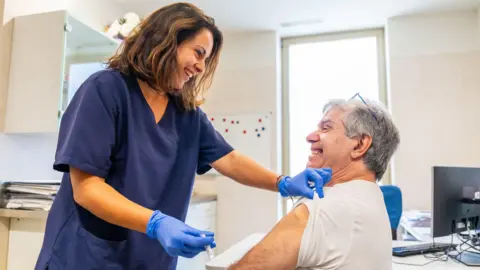Cold plunges and kombucha: Do winter wellness trends really work?
16 hours agoYasmin RufoBBC News

 Getty Images
Getty ImagesEvery winter, the search for the secret to staying well seems to intensify.
Supermarket shelves fill with “immune-boosting” shots, cold water swimming groups grow and social media becomes crowded with tips on how to fend off seasonal bugs.
But with so many remedies promising to keep colds and flu at bay, how much of it actually works and is it even possible to boost your immune system in the first place?
Cold water swimming: A buzz, not a boost

 Getty Images
Getty ImagesCold water swimming has surged in popularity, with some enthusiasts convinced it keeps winter illnesses at bay.
Immunologist professor Eleanor Riley tells BBC Radio 4’s Inside Health podcast that the post-swim “high” is real, but it’s driven by adrenaline and endorphins.
“If you take a blood sample before and after a cold swim, white blood cell levels do rise,” she explains. “But that’s because the body thinks an infection might be coming, so cells move into the bloodstream.
“Within hours the levels go back to normal so your body hasn’t created any more white blood cells.”
Professor Riley adds that part of the benefit of cold water swimming comes from building a social connection.
Feeling “brighter, more alert and more connected” has real physiological effects.
Professor John Tregoning, a vaccine immunologist, says the benefits are mostly indirect and much of what makes people feel healthier in winter may come down to stress.
“It reduces stress because you’re outdoors with nice people in nice places. But you could get the same from dancing, singing or going for a run.”
Being in nature can lower your blood pressure and stress hormones that can dampen immune responses.
GP Dr Margaret McCartney explains that moderate exercise does show evidence of reducing viral infections, but that could be any form of exercise, not just cold water swimming.
Kombucha: Interesting but little evidence

 Getty Images
Getty ImagesMany people turn to fermented drinks like kombucha which promises to boost the microbiome and, by extension, the immune system.
But Dr McCartney remains cautious.
“There are lots of theories about why a diverse microbiome is good, but we don’t have strong enough real-world evidence to recommend kombucha to patients.”
Professor Tregoning adds that while it’s true that the microbiome changes during infections, it usually returns to its previous state afterwards.
Dr McCartney says while drinks like kombucha present “interesting ideas about the role of the microbiome”, there isn’t a clear link with how it can help boost your immune system.
Supplements: Just expensive urine

 Getty Images
Getty ImagesVitamin C has long been sold as a winter essential, but according to Dr McCartney, the evidence simply isn’t strong enough to recommend it when it comes to fighting off colds.
She says the same goes for multi-vitamins which do very little beyond giving you “expensive urine”.
However, Vitamin D is slightly different as “there’s theoretical evidence of a small decrease in respiratory infections”.
But, she explains that not everyone will see a benefit if they take it and it’s only people “with low vitamin D and pre-existing respiratory diseases” who will likely benefit.
Many people in the UK remain deficient in Vitamin D and Professor Tregoning suggests that winter sunlight and getting outdoors can help.
Vaccinations: The only boost that works

 Getty Images
Getty ImagesThe likes of turmeric shots, ginger drinks and fancy nasal sprays do nothing to boost your immune system, according to Dr McCartney.
Professor Tregoning says that a nasal spray can help with a blocked nose but all you need is a simple saline spray which is just salt and water.
“The solution can dilute the blocked nose, stimulate turnover of mucus and relieve inflammation.”
All three experts agree that ultimately only one intervention can strengthen the immune system and that’s vaccination.
Professor Riley recommends the flu jab which takes from seven to 10 days after the jab to take effect.
While you can’t boost your immune system in the dramatic way winter wellness trends often promise, the experts advise supporting it by avoiding smoking, maintaining a healthy weight, finding a regular sleep routine and doing any activity that helps reduce stress.
Dr McCartney says you can also reduce your risk of colds by being in well ventilated spaces and washing your hands regularly and properly.